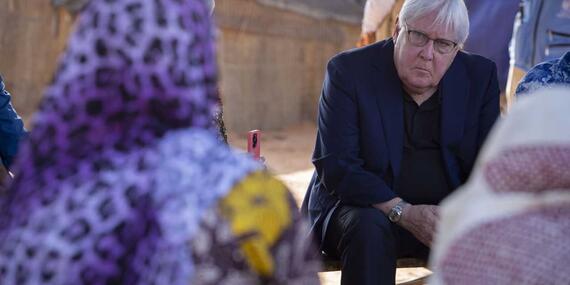UN humanitarian chief calls for more support to reach all Burkinabé

UN Under-Secretary-General for Humanitarian Affairs and Emergency Relief Coordinator, Martin Griffiths completed his mission to Burkina Faso today and issued the following statement:
I have just wrapped up a short mission to Burkina Faso. What I saw and heard left a deep impression on me.
This is a critical time for Burkina Faso.
First, humanitarian needs are rising fast. A quarter of the population, or some 4.9 million people need emergency assistance, a staggering 40 per cent more people than at the beginning of the year. One in ten Burkinabe is displaced from their homes by devastating conflict and climate shocks.
Second, growing insecurity and blockades in many areas have left communities cut off from the rest of the country and facing growing hunger. Aid workers are struggling to reach these people who need assistance.
And third, the amount of humanitarian assistance available is simply inadequate. To provide critical life-saving relief to those in need with a level of dignity and respect that every human being deserves, we urgently require additional resources. Our US$805 million response plan in Burkina Faso is less than a third funded.
This morning, I met people, displaced and host communities, in Djibo, a town in northern Burkina Faso. I spoke with women and children who have eaten only leaves and salt for weeks. The situation is so bad that women are risking their lives, crossing lines of control at night in search of food.
I spoke with community leaders who urged those in charge to open roads for food, water, and vital medicine to reach them, to save lives. There are peaceful initiatives to find solutions and there is still hope. The people of Djibo deserve our respect, admiration and much more support in this hour of dire need.
It was important for me to meet the new transition President, Ibrahim Traoré, and we discussed these points in detail. I stressed the need for protection of civilians, including for those unable or unwilling to leave areas of military operations. I also reiterated the responsibility of national authorities to create a conducive environment for humanitarian operations and enable humanitarian access, so that we can reach all Burkinabé in need, everywhere across the country.
Despite these challenges, humanitarian action is making a difference in Burkina Faso. In the first nine months of this year, the United Nations and our humanitarian partners brought food assistance to 1.8 million people and supported 740,000 people with access to health care in areas where health facilities have closed down and where medical supplies are lacking. We also provided access to water, hygiene and sanitation to 550,000 people and nutritional support to 421,000 children and new and expecting mothers.
Since the beginning of the year, humanitarian donors have generously channeled about US$100 million through the UN’s Central Emergency Response Fund, for Burkina Faso, Cameroon, Chad, Mali, Mauritania, Niger and Nigeria. This funding has enabled us to respond to population displacement, drought, famine risk and malnutrition. Another US$33 million has been channeled through the Regional Humanitarian Pooled Fund, which allows us to better support local community led programmes. However, much more resources are needed to tackle the humanitarian needs that plague the region.
